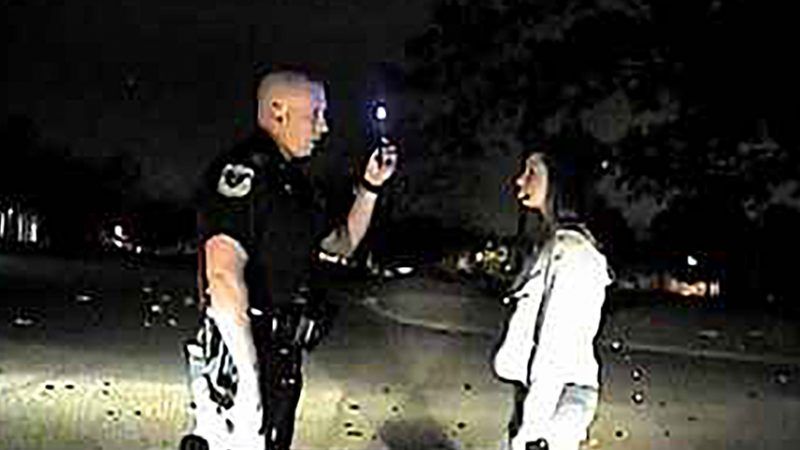Cops Who Claim They Know When Drivers Are Stoned
Even when blood tests say they're not

To the untrained eye, Katelyn Ebner seems completely sober in the 28-minute dashcam video of her 2016 encounter with a Georgia cop. But Cobb County police officer Tracy Carroll, who has pulled the 23-year-old waitress over for failing to maintain her lane as she made a left turn, perceives "numerous indicators" that Ebner is under the influence of marijuana.
Ebner repeatedly assures Carroll she doesn't "smoke weed" or "do any of that stuff" and volunteers to prove it by taking a drug test. "You're going to jail, ma'am," he replies. "I don't have a magical drug test that I can give you right now."
Carroll does not need a magical drug test, because he is a magical drug test—or so the Cobb County Police Department would have us believe. The experiences of Ebner and two other innocent motorists he arrested, described in a federal lawsuit they filed in September, suggest otherwise.
The plaintiffs, who are represented by the American Civil Liberties Union (ACLU) of Georgia, were all stopped for briefly touching or crossing the line at the edge of their lanes. They were all evaluated by Carroll, who deemed them stoned despite their protests to the contrary. They were all arrested for DUI and spent a night in jail. And their charges were all eventually dropped after tests found no trace of marijuana—active THC or inactive metabolites—in their blood.
"Plaintiffs suffered the loss of liberty, extensive monetary losses, reputational damages, humiliation, and emotional distress," the complaint says, "because a police officer had a hunch, based on deeply flawed drug-recognition training, that they might have been smoking marijuana." The ACLU notes that Carroll, who is certified as a "drug recognition expert" (DRE), used a "watered-down version" of the 12-step DRE protocol, which the complaint says "is itself riddled with flaws."
Several of the tests that Carroll used on Ebner, such as horizontal gaze nystagmus (an involuntary eye twitch), nose touching, standing on one foot, and walking heel to toe, are good measures of alcoholic intoxication. But as the Supreme Judicial Court of Massachusetts noted in a September 19 ruling, they remain unvalidated or controversial as indicators of marijuana use.
In any case, it's not clear exactly why Carroll thought Ebner was high. Although her eyes were watery (which she said was a reaction to a cleaning solution she used at work), she seemed to perform the sobriety tests just fine. Remarkably, Carroll's bosses claim he had probable cause to arrest Ebner for driving while stoned—and would have even if he'd already seen the blood test results showing she wasn't.
This article originally appeared in print under the headline "Cops Who Claim They Know When Drivers Are Stoned."
Show Comments (1)